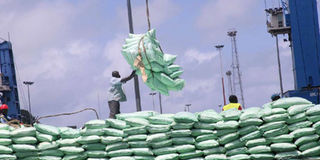Queries as barons import tonnes of sugar amid ban

Sugar imported from Thailand offloaded at the port of Mombasa in 2017.
What you need to know:
- According to AFA, total import for brown and white sugar under Comesa as at October 31 is 277,973 tonnes.
Shadowy companies have imported excess sugar into the country, superseding the 2020 quota from the Common Market for East and Central Africa (Comesa), in spite of a government ban.
Stakeholders are puzzled by the sudden exhaustion of import quota, after the Agriculture and Food Authority on Monday warned the government would now levy full duty on further imports.
It remains unclear how the quota was exhausted during an active ban on imports since July.
The country's import quota for the year ending December 2020 from Comesa member states was pegged at 250,000 tonnes. This was negotiated based on the annual national consumption as well as projected sugar production.
Duty-free sugar
According to AFA, total import for brown and white sugar under Comesa as at October 31 is 277,973 tonnes.
“The allocated quantity is entitled to duty-free treatment and any excess above the quota attracts 100 per cent duty,” reads a November 9 letter signed by AFA boss Rosemary Owino.
The AFA boss did not respond to our questions on how the quota was exhausted and whether the ban on importation was still in force, despite confirming receipt. Efforts to reach the Agriculture Cabinet Secretary Peter Munya were also fruitless, as calls and texts went unanswered.
But several stakeholders pointed the Sunday Nation to a questionable scheme by some importers, who have flooded the market with the duty-free sugar and are planning to make a killing after the window is closed and prices of the commodity shoot up when imports begin to attract duty.
A former top government official who worked in the sugar sector who requested anonymity told the Sunday Nation that the ban on imports has been in force but a lot of sugar had been on its way before the ban, which essentially locked out potential competition for the monopoly dealer.
Kenya banned sugar imports in July and suspended trading licences of the importers as it moved to curb the influx of cheap sugar in the domestic market and protect local farmers.
Covid-19 curfew
The imports had rendered Kenyan mills uncompetitive, according to Mr Munya, who announced the ban noting that there had been increased illegal importation, especially through the Busia border point, during the Covid-19 curfew period.
Ex-factory prices for the mills remained at Sh85,260 a tonne, compared to the imported product, whose cost, insurance, and freight (CIF) price – Sh60,117 for the same quantity – proved detrimental to the locally manufactured sweetener.
Kenya is usually allowed to import 350,000 tonnes from Comesa to fill the local deficit, which raises the question why AFA pegged its directive on the 250,000 tonnes in announcing the end of the import quota.
“There was no official communication from Mr Munya rescinding his earlier public statement banning imports to the best of my knowledge but sugar kept on flowing with their approval with a factory located in Nyanza receiving several trucks of sugar daily. State capture is at play,” the source intimated.
@Edwincowino; [email protected]





